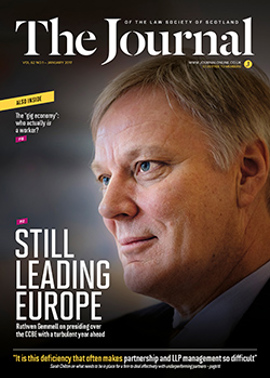Brexit: the end of cross-border practice?

The UK vote to leave the EU came as a surprise, even a shock, to many lawyers in the UK and beyond. Since then, the profession has begun to look at the legal consequences of UK withdrawal and what this means for different sectors. Professional services, including legal services, are important to the UK economy and a key part of the wider EU economy, with a net trade of over £4 billion with the EU in 2013.
One of the UK Law Societies’ priorities has always been the EU-specific framework for the cross-border provision of legal services, which has played a huge role in enabling the provision of such services within the EU/EEA (European Economic Area) and Switzerland. In particular:
- The Lawyers’ Services and Lawyers’ Establishment Directives allow lawyers to provide services on a temporary or permanent basis using their home title, practise host member state law, and work for and employ local lawyers. These directives also regulate provisions on codes of conduct, professional indemnity insurance, representation in the host state courts and joint practice. The Establishment Directive further allows EU lawyers to requalify in another member state without equivalence examinations after three years of regular and effective practice of host state law, including EU law.
- The Professional Qualifications Directive provides for the recognition of legal qualifications (among others) through assessment and, if necessary, measures such as additional tests or supervised practice. Following the CJEU judgment in Morgenbesser (C-313/01) and a review of the directive, it now also provides for the recognition of professional traineeships abroad.
The UK Law Societies would like to maintain this mutual ability to provide legal services after the UK leaves the EU, however the other aspects of the UK's withdrawal negotiations unfold.
What are the alternatives?
Without a specific agreement on these issues, the UK might fall back on the General Agreement on Trade in Services (GATS) commitments, which stem from WTO membership. One of the most important differences between the WTO regime and the EU framework is the practice areas in which foreign lawyers are allowed to provide services. Whilst the directives allow EU/EEA/Swiss lawyers to practise host member state law (including EU law), this is not possible under the current GATS schedule for commitments of the EU, which limits third country lawyers to providing “legal advice in home country law and public international law (excluding EC law)”. While it is possible, in theory, for individual member states to grant higher levels of access to foreign lawyers, in practice most member states have not gone beyond their GATS commitments.
Furthermore, the provisions concerning requalification and integration in a host state profession are not included in the GATS schedules, although it is possible for individual member states to enact their own rules in that area. Indeed, there exist some bilateral mutual recognition agreements covering legal services, such as France-Quebec and American Bar Association-Brussels Bars.
It is however not merely the basic right to provide legal advice and requalify in a host member state that the EU framework has facilitated: it is also representation, including rights of audience, in domestic and European courts, i.e. the CJEU and EU General Court.
Last but not least, a crucial benefit stemming from EU membership is the protection of lawyer-client communications. According to settled case law of the CJEU, the current framework safeguards legal professional privilege (LPP) for clients of all EU/EEA/Swiss-qualified lawyers but not those of lawyers from third countries. LPP is fundamental to legal professionals because it protects their clients wherever legal advice is provided within Europe – and the UK will certainly still be part of Europe.
Maintaining links
It is no surprise, therefore, that many solicitors from England & Wales and Northern Ireland have decided to requalify in Ireland. According to data from the Law Society of Ireland, a total of 1,347 applications were made to requalify in the country in 2016, which represents a 275% increase compared with the previous year. There were 810 prospective transferees from England & Wales and 25 from Northern Ireland (Scottish solicitors are not able to requalify automatically). In most cases, the transferees were anti-trust, competition or trade law practitioners based in London or Brussels.
Maintaining the existing or equivalent legal services arrangements for solicitors is already a key priority of the Law Society of England & Wales during the withdrawal negotiations. The organisation has also emphasised its commitment to retaining an open market for legal services to allow lawyers and law firms from across Europe to practise in the jurisdiction.
Similarly, the Law Society of Scotland has raised continued professional recognition and practice rights, as well as respect for legal professional privilege as it applies to Scottish solicitors within the EU, as key issues of concern to its members. Whatever the outcome of the Government negotiations, the Society stressed that it will continue to maintain positive links with colleagues in EU bar associations, seek clarity in relation to admission and continued practice rights, and support its members through the transitional process.
The Law Society of Northern Ireland is in a unique position following the referendum, being in the only region of the UK which has a land border with another EU member state, the Republic of Ireland. It is keen to ensure that cross-border practice in relation to UK and EU law is protected and that an open market is promoted as the exit negotiations begin. In particular, the welcome commitment to preserve the free travel area with the Republic in the wake of Brexit raises questions around how precisely this will operate after exiting the EU.
It will be long before we know what kind of relationship the UK will have with the EU. It will remain a priority for the Law Societies to highlight the practical consequences and challenges of the UK’s withdrawal from the EU, especially its impact on the legal profession and the justice system as a whole.
In this issue
- Private prosecution: the Glasgow Rape Case revisited
- The commercialisation of space
- Feminism: all is not what it seems…
- Retaking the narrative on complaints
- Reading for pleasure
- Opinion: Alan McIntosh
- Book reviews
- Profile
- President's column
- RoS riding to the four (hundred)
- People on the move
- Scot in the European hot seat
- When partners fall short
- Uber: a great gig?
- Brexit: the end of cross-border practice?
- Closing in: the gender pay gap rules
- Simple procedure – it's complicated
- When changing the defender is OK
- Solemn procedure: beware the changes
- Divorce and the new state pension
- Delivery of alcohol: a “game changer”?
- A tale of two "Budgets"
- Scottish Solicitors' Discipline Tribunal
- "One-shot" rule sees rejection income soar
- Law without frontiers
- CJEU decision supports LPP protections
- Society thank-you for STARTS support
- From the Brussels Office
- Law reform roundup
- Expertise plus: promoting a sector strength
- Paralegal pointers
- What to do about client interest?
- Still free to market?
- New year, new contact
- Ask Ash
- Paying homage to King Cash






